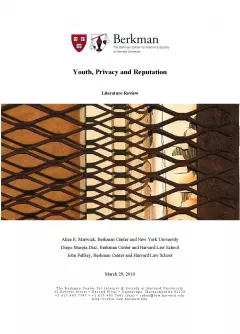New Paper: Why parents help their children lie to Facebook about age: Unintended consequences of the COPPA
Authored by danah boyd, Eszter Hargittai, Jason Schultz, and John Palfrey
The Berkman Center for Internet & Society is pleased to share a new paper published in First Monday, "Why parents help their children lie to Facebook about age: Unintended consequences of the ‘Children’s Online Privacy Protection Act,’'" authored by Berkman community members danah boyd, Eszter Hargittai, Jason Schultz, and John Palfrey.
The paper can be accessed here: <http://www.uic.edu/htbin/cgiwrap/bin/ojs/index.php/fm/article/view/3850/3075>
Abstract from the authors: Facebook, like many communication services and social media sites, uses its Terms of Service (ToS) to forbid children under the age of 13 from creating an account. Such prohibitions are not uncommon in response to the Children’s Online Privacy Protection Act (COPPA), which seeks to empower parents by requiring commercial Web site operators to obtain parental consent before collecting data from children under 13. Given economic costs, social concerns, and technical issues, most general–purpose sites opt to restrict underage access through their ToS. Yet in spite of such restrictions, research suggests that millions of underage users circumvent this rule and sign up for accounts on Facebook. Given strong evidence of parental concern about children’s online activity, this raises questions of whether or not parents understand ToS restrictions for children, how they view children’s practices of circumventing age restrictions, and how they feel about children’s access being regulated. In this paper, we provide survey data that show that many parents know that their underage children are on Facebook in violation of the site’s restrictions and that they are often complicit in helping their children join the site. Our data suggest that, by creating a context in which companies choose to restrict access to children, COPPA inadvertently undermines parents’ ability to make choices and protect their children’s data. Our data have significant implications for policy–makers, particularly in light of ongoing discussions surrounding COPPA and other age–based privacy laws.
We welcome you to share this research with friends, colleagues, students, and others that may be interested, and you can visit http://cyber.harvard.edu/ & http://youthandmedia.org/ for more information about the Berkman Center's work on issues related to youth, safety, law, and policy. As always, we welcome your feedback.
You might also like
- storyDebating CDA 230
